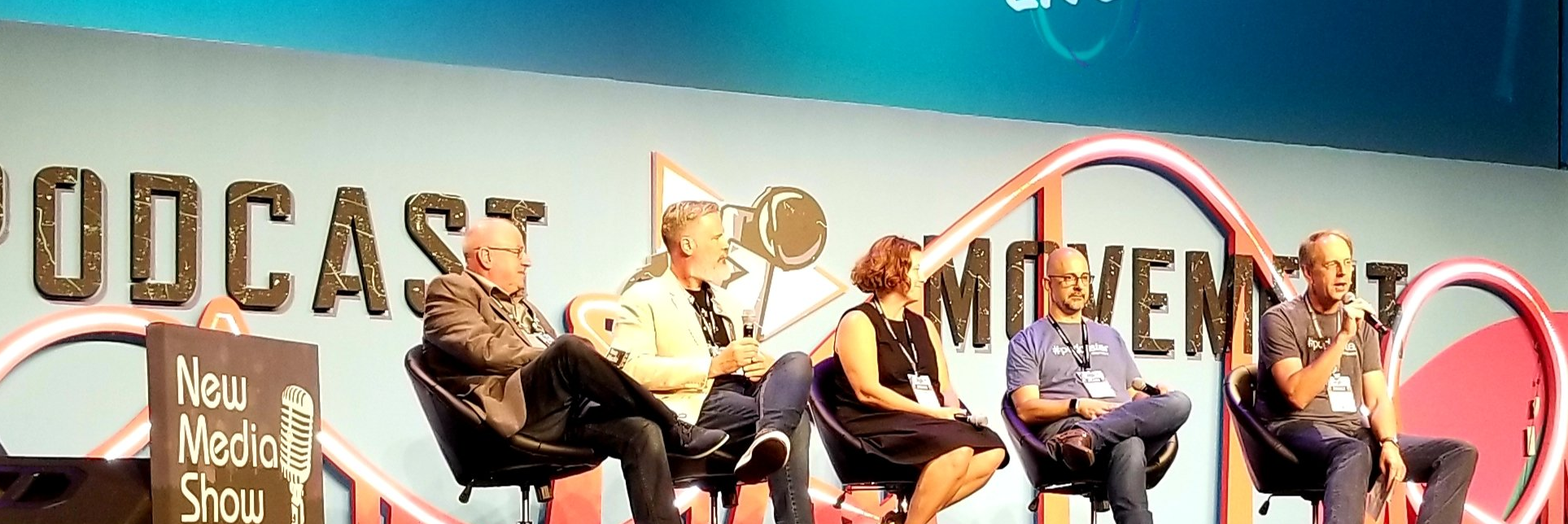I must say that the above headline for this post is very teasy and search baity, but rest assured these are tips based on 6 years of experience in the podcasting space. I know that success can be many things in podcasting and building a huge audience does not need to be a gauge of your success.
Here are the 5 tips that I have been promoting for many years in podcasts as a guest and in my direct one-on-one communications with hundreds of podcasters over the many years that I have been involved in making shows and promoting podcasting. I totally believe that the success of your podcast will hinge on your ability to deliver on some key things to build and maintain an audience.
1) Make sure you have good to excellent audio or video quality in every episode you publish. What ever the topic you choose this will be a key driver for gaining and keeping an loyal audience.
It might also be very helpful to make sure your audio levels are normalized and at proper loudness levels by using a free tool called “The Levelator“, made by The Conversations Network. This tool was designed to level wav files and clean the audio over more then one segment stitched together and is a great tool for any audio podcaster.
2) Focused presentation of the topic(s) promised the audience by the show title and description. This really is key, as your audience has committed to your show if they have tried an episode to consume, you really only have one shot to hook them into being a regular audience member. Most will download one episode and start listening and decide if it is of value to them, thus you must hook them early.
The key for you as the show host or producer is to explain very early in all of your episodes what the value is in the episode at the beginning of every show. This means tell your audience what will be discussed in this episode, just like the NBC Nightly News will give you a run down of all the headlines right at the very beginning of every new episode. This is important to your audience and for you as the podcaster. This helps you get FOCUSED on the topics covered in each episode and helps your audience to anticipate what value they will get from the program and help them decide to keep listening or watching. This is a time honored practice from broadcast radio and is of huge value to podcasters as well.
It is important to have some personal talk and fun banter amoung the co-hosts, but be very aware that doing this in excess will drive away your audience over time. Stay focused on delivering value in what ever form that is for your show.
3) Audience contributed content and involvement is really key to the long-term success for your show. This is not always easy or simple to do for all shows, but is one that is worth the effort. What this really involves is creating audience feedback loops that involves in-episode conversations with your audience. This is being done in a variety of ways today; Live streaming of you show production with a chat board running during the recording, giving out a show email address and discussing those emails in-episode, setting up an voice mail number and or asking for emailed mp3 files – then playing those on your show and commenting back. You really want to create a conversation with your audience as you cannot come across as only having a one-way talking relationship with them. This also requires actually replying to those audience members directly and even doing real world meet-ups to actually physically meet your avid show fans.
4) Engaging Show Promo Album Art, Show Title and Text Descriptions are key to the success of any podcast as these are the first things that are visible to potential audience members. These are a huge part of your show marketing strategy. You need to make sure you put a lot of thought and investment into these areas. Doing these right will help you get featured in iTunes or Zune, but will also help you be found in search engines. Most of all doing these things well will set you up for success. The podcast promo album art is the number one most important to get right of all of these. This standard 300×300 or 600×600 pixel sized .jpg or .png image needs to be colorful and use large bold title text to communicate the topic and or name of the podcast. I would suggest looking at iTunes and Zune and see what album art is being featured and what is being used by the top podcasts. This will give you a good idea about the bar you must achieve. The other thing to keep in mind is that podcast album art must be linked to in your RSS feed for it to be picked up and used on the Zune and iTunes podcast platforms.
The shows text descriptions are also important to help sell the value of the show and also communicate who the hosts are and credentials they bring to the topics covered. It is also very important to use a topic descriptic name or title of the show. Always keep search engines in mind when you name your show and use it as the title to your podcast feed. The other often forgotten part is the importance of episode level descriptions or show notes that breaks the show down into time durations for show segments and the topics discussed in each episode.
5) Distribution, Distribution, Distribution to a podcast is not much different then Location, Location, Location is to physical world retail. You can benefit a lot for learning from this time honored principle. You have created a show that is very much like an radio show on broadcast radio and thus many of the same leavers can impact its success.
One of the key concepts is making your podcast series available where an audience already exists for audio or video shows today. This practice is called syndication or online syndication is a better term for it. The content publishing world is very crowded with the growth of the web and Internet. It is difficult to rise about the noise of the online world of existing publishers and now social media platforms has made more and more people content publishers in one form or another.
The keys to getting the distribution you need or want is to go after it and earn it. Take advantage of all the ways to let people know of your show and submit your podcast feed to all the available podcast platforms and make your podcast feed URL available on your website. If you need to get your podcast feed into Zune then send me an email with the RSS feed to (rob at zune.net) and I will add it myself.
You also need to get involved in the topic community that your podcast covers and become a thought leader and comment on other community members websites, twitter, facebook accounts. You also need to attend meet-ups and write longer-form content like this as it has become a lost practice as everyone is going for only writing short stuff these days. This will help you in the search engines and you can using these in your social media strategy to more deeply engage with your audience.
I hope this article was helpful. Please feel free to write me anytime at rob at webtalkradio.com to share your story of your podcast. You never know – it might help you get featured on Zune.
Rob Greenlee
 “Stitcher Stitcher is a free talk radio app that lets you listen to your favorite programs on demand. You can choose from more than 7,000 shows, and the app is available on all major phone platforms — including Windows Phone for the first time.
“Stitcher Stitcher is a free talk radio app that lets you listen to your favorite programs on demand. You can choose from more than 7,000 shows, and the app is available on all major phone platforms — including Windows Phone for the first time.
